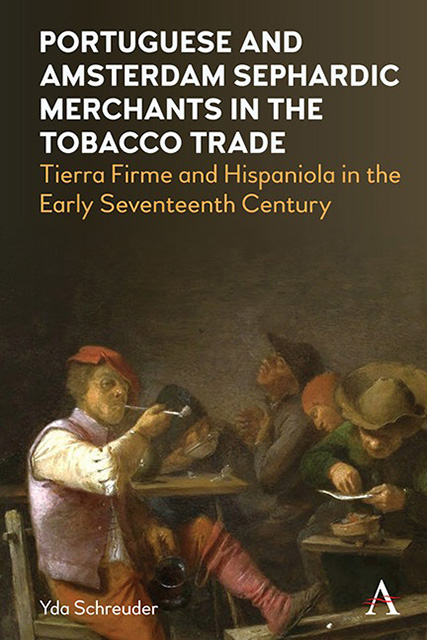 Portuguese and Amsterdam Sephardic Merchants in the Tobacco Trade
Portuguese and Amsterdam Sephardic Merchants in the Tobacco Trade Published online by Cambridge University Press: 17 October 2023
Trade and Navigation between Spain and Its Colonies
Trade rivalry between the Dutch Republic and the Spanish Habsburg regime during the Eighty Years’ War was fierce and concerns expressed by Spanish officials with respect to illegitimate trade in which English, French and Dutch privateers participated and Portuguese merchants assisted in trade between Spain and its colonies were omnipresent in reports sent from Tierra Firme and Hispaniola. In the Preface to The Dutch in the Caribbean and on the Wild Coast, 1580–1680, Goslinga (1971) notes that the documentation on the role the Dutch played in the Caribbean region and along the coast of Tierra Firme during the seventeenth century derived mostly from accounts of their foes. To explore the extent and nature of the tobacco contraband trade in the late sixteenth century and early seventeenth century we will therefore depend to a large extent on Spanish and Portuguese accounts and records most of which are found in the Archives of Seville and Lisbon. Besides a discussion of the Engel Sluiter Historical Documents Collection as a source of information for the study of the tobacco contraband trade in the early seventeenth century, this chapter will thus present a brief discussion about the early history of trade and navigation between Spain and its colonies which was subjected to a strict set of rules and for the most part excluded foreigners. The records of the Casa de Contratacion in Seville reveal the extent of illegitimate trade as documented by Spanish officials responsible for reporting on trade and navigation to and from the colonies. In addition, in the reports sent by the Audiencias to the Crown and Council, there is frequent mention of interlopers and foreigners interfering in Spanish maritime interests and about efforts made by the officials to control colonial trade in particular as it involved Dutch merchants and mariners during the Eighty Years’ War.
Trade and navigation between Spain and its colonial possessions was dominated by the Seville monopoly; the Casa de Contratacion. The first Royal ordinances for the Casa de Contratacion were issued in 1503 and officials were appointed by the Crown to administer the possessions and issue licenses to trade but it was soon clear that strict schedules and regulations did not work.
To save this book to your Kindle, first ensure [email protected] is added to your Approved Personal Document E-mail List under your Personal Document Settings on the Manage Your Content and Devices page of your Amazon account. Then enter the ‘name’ part of your Kindle email address below. Find out more about saving to your Kindle.
Note you can select to save to either the @free.kindle.com or @kindle.com variations. ‘@free.kindle.com’ emails are free but can only be saved to your device when it is connected to wi-fi. ‘@kindle.com’ emails can be delivered even when you are not connected to wi-fi, but note that service fees apply.
Find out more about the Kindle Personal Document Service.
To save content items to your account, please confirm that you agree to abide by our usage policies. If this is the first time you use this feature, you will be asked to authorise Cambridge Core to connect with your account. Find out more about saving content to Dropbox.
To save content items to your account, please confirm that you agree to abide by our usage policies. If this is the first time you use this feature, you will be asked to authorise Cambridge Core to connect with your account. Find out more about saving content to Google Drive.